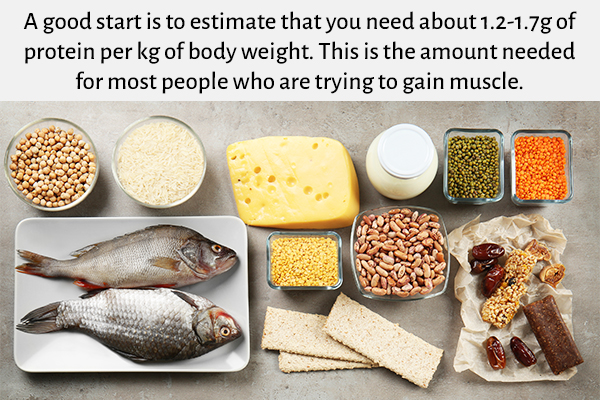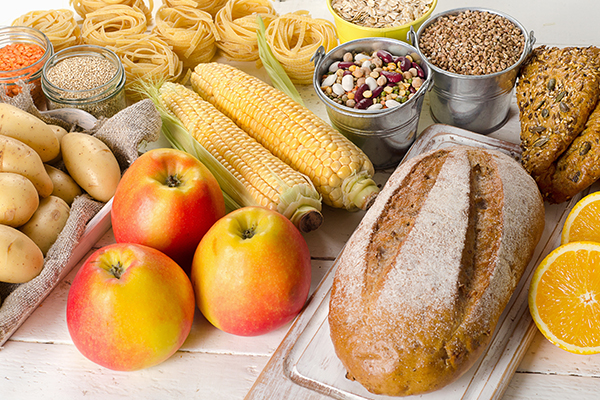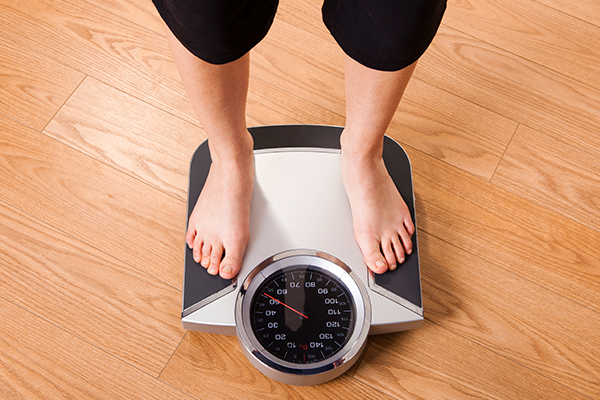In this article:
There are many benefits to building and maintaining adequate muscle mass. These range from increasing strength and stamina to being able to move furniture more easily around the house. Lean muscle is also essential for helping maintain a consistent body weight.

Whatever your reason for wanting to build muscle, it is important to have a healthy, balanced diet and exercise regularly.
Food, Diet, and Tips to Build Muscle
1. Protein intake

The most important nutrient for building muscle is protein. Protein is made up of molecules called amino acids. (1) There are nine amino acids that are referred to as “essential amino acids” because your body is unable to make them and have to be derived from food sources.
The amino acids that you receive from your diet vary depending on the protein consumed. Chicken, for example, does not contain the same amino acids as lentils.
The amount of protein that you need depends on your size and lifestyle. A man that weighs 200 lb and does heavy lifting every day is going to need much more protein than a female weighing 130 lb who does mostly cardio training.
A good start is to estimate that you need about 1.2–1.7 g of protein per kg of body weight (1) (divide your weight in pounds by 2.2 to determine kg). This is the amount needed for most people who are trying to gain muscle.
- Animal-based proteins contain all of the essential amino acids, and they are called “complete proteins.” (2) It is much easier, therefore, to consume adequate amounts of protein with animal-based proteins, such as meat, fish, dairy products, and eggs. (3) Three ounces of meat or seafood contains approximately 15–25 g of protein.
- Plant-based proteins (incomplete proteins) do not contain all the essential amino acids (4) that humans require. However, it is possible to get all of them with a variety of plant-based proteins in your diet. By combining multiple sources, you are increasing the likelihood of getting a complete protein, such as beans and rice. Quinoa, nuts, beans, lentil, and soy are examples of plant-based proteins. (4) Protein content varies among these foods, so be sure to check labels when purchasing.
Note: Too much protein can damage your kidneys and bone structure. Excessive protein consumption from animal sources has been linked with high cholesterol and other heart problems.
2. Carbohydrates intake

In addition to protein, it is important to consume enough carbohydrates. Your body needs carbohydrate because it is the preferred energy source for your brain and liver. (5)
While you can technically consume low-carb diets, they are not ideal for your body. About half of your calories should come from carbohydrates such as whole grains, fruit, and starchy vegetables.
Whole grains contain more fiber, vitamins, and minerals, many of which are also important for energy and muscle control. Be sure to consume a snack with carbohydrate prior to a workout to ensure you have enough energy.
3. Strength or resistance exercises

Simply consuming enough protein and carbohydrate is not going to help you gain muscle, though. Strength training or resistance training is required to put on muscle mass. (6)
Pushups and weights are examples of resistance training, but you can also go to the gym and utilize the resistance equipment.
A personal trainer or other certified exercise specialists can guide you on how to get started and what will work best for you. Be sure to find a trainer with a legitimate credential; an online search should be able to accomplish this.
4. Water intake
Water is essential for anyone planning to engage in exercise. This will help you maintain regular body temperature and keep your body functioning normally. The more active you are, the more water you should be drinking.
A lot of people prefer beverages with electrolytes, such as sports drinks. However, these are not necessary unless you are exercising heavily, such as running a marathon. There is no harm in drinking them if that is your preference, just keep an eye on the added sugars.
5. Maintaining a healthy body weight

As you age, you are more likely to lose muscle and gain fat. The more you exercise and build muscle, the more you increase your metabolism to help maintain a healthy body weight. Building and maintaining muscle is, therefore, beneficial to everyone.
Please bear in mind that you should always talk to your doctor before making any major changes to your physical activity level or diet.
Preventive Measures
I would discourage you from starting a fad diet or other trendy nutrition plan. The research shows that these diets are not sustainable for most people, and after a few months, they go back to their old ways. (7)
The best approach is to set small, realistic goals. If you fail to meet a goal, reassess and start over.
If you aren’t sure where to begin, consult a registered dietitian for proper guidance. They have the training and knowledge to help you get started and meet you where you are at in your life.
Final Word
Building muscle is beneficial for all healthy individuals that have been cleared by their health care provider. The benefits range from maintaining your body weight to strength and endurance. Your diet and physical activity will vary based on your individual fitness goals and lifestyle.
Because it is possible to get enough protein from a variety of diets, there is no one specific diet that is recommended for building muscle. It’s important for all people to eat a healthy diet with a balance of carbohydrate, fat, and protein.
- Was this article helpful?
- YES, THANKS!NOT REALLY


